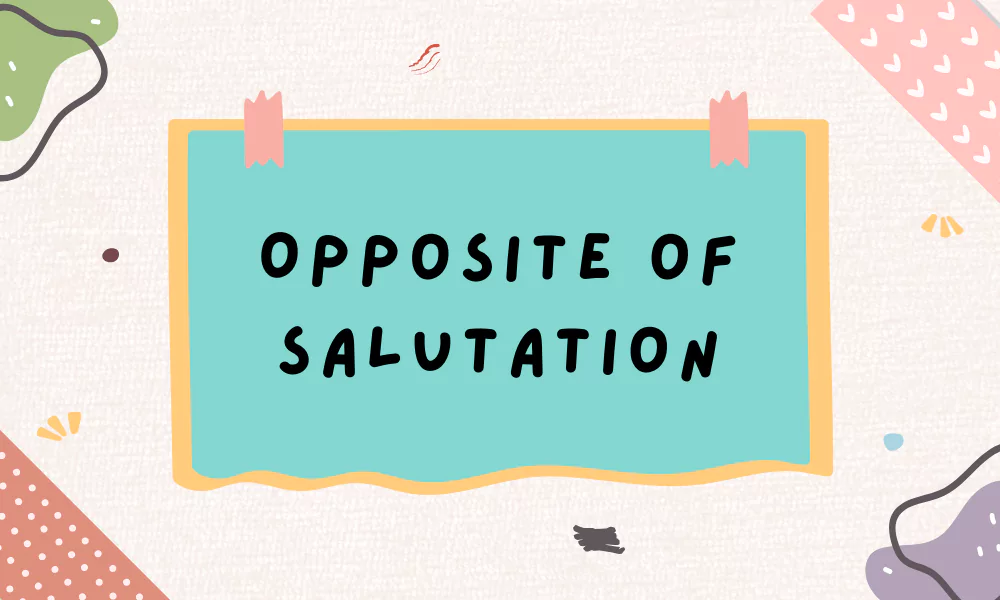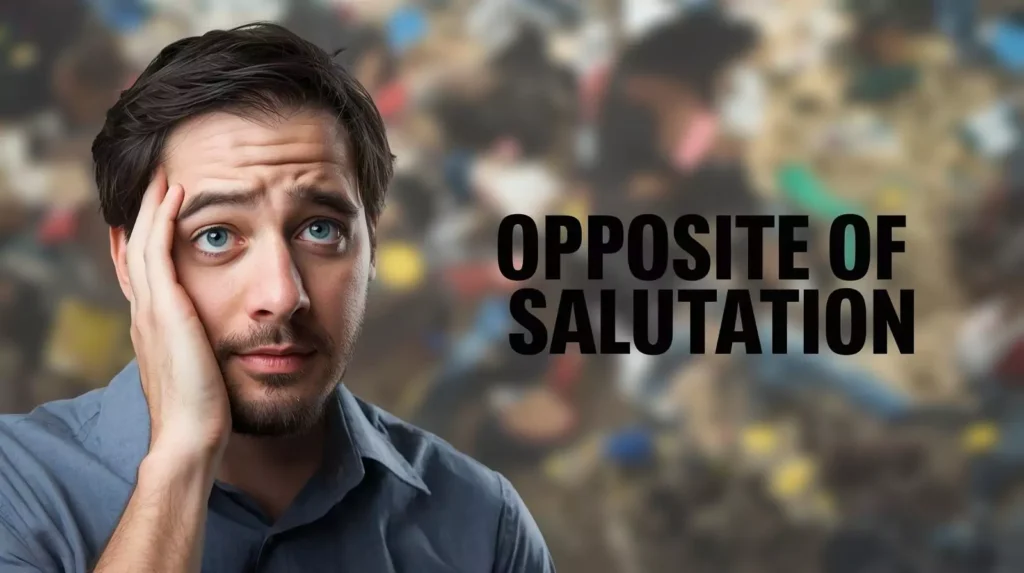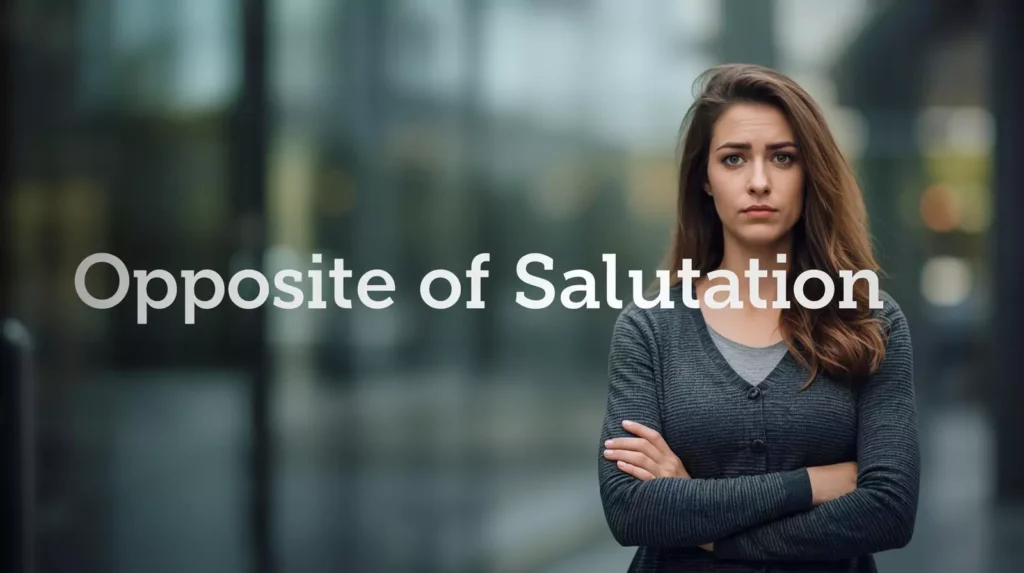Opposite of Salutation – Meaning, Antonyms, and Examples Explained

A salutation is more than just a polite greeting but it’s a social gesture that opens communication with warmth, respect, and acknowledgment. But what happens when the opposite occurs? Instead of welcoming someone, a person might show dismissal, indifference, or even coldness. The opposite of salutation can be expressed through words like farewell, snub, dismissal, or ignorance, each carrying a different level of detachment or disrespect. Understanding these opposites not only improves your vocabulary but also helps you recognize how communication can shift depending on tone, context, and intention.
Meaning of Salutation
A salutation is a word, phrase, or gesture used to greet someone politely. It sets the tone for communication, whether in person with a handshake or bow, or in writing with openings like Dear Sir or Hello. Salutations signal respect, friendliness, and willingness to engage. In written communication, they also provide structure and formality, marking the beginning of interaction.

Why Knowing the Opposite of Salutation Matters
Recognizing the opposite of salutation is important because it helps us interpret social cues and responses more accurately. Just as a warm greeting builds rapport, a dismissive gesture or farewell signals closure or disinterest. In real-life communication, these contrasting expressions show whether someone is open to dialogue or withdrawing from it. For writers, students, and professionals, knowing both salutations and their antonyms enriches expression, sharpens emotional nuance, and strengthens interpersonal understanding.
Antonyms of Salutation with Meaning And Example
- Farewell – An expression of parting or goodbye.
Example: She waved a quick farewell before leaving the room. - Goodbye – A common phrase used to end a conversation or meeting.
Example: He said goodbye and closed the call abruptly. - Dismissal – Indicating rejection or disregard.
Example: His curt dismissal of her greeting felt rude. - Snub – A deliberate act of ignoring or disrespecting someone.
Example: She felt hurt by his cold snub in public. - Ignorance – Showing indifference by not acknowledging someone.
Example: His complete ignorance of her presence spoke volumes. - Coldness – Lack of warmth or friendliness in response.
Example: His coldness made the meeting uncomfortable. - Indifference – A neutral, uncaring attitude.
Example: He responded with indifference to her cheerful hello. - Disregard – Choosing not to recognize or acknowledge.
Example: The boss’s disregard for his staff upset many employees. - Neglect – Failure to pay attention or show acknowledgment.
Example: Her neglect of his presence created an awkward silence. - Silence – Lack of any verbal acknowledgment.
Example: His silence after her greeting was unsettling. - Hostility – Expressing aggression instead of warmth.
Example: The guard’s hostility discouraged further approach. - Alienation – Creating emotional distance rather than connection.
Example: His alienation from old friends showed in his behavior. - Rebuff – A sharp or abrupt rejection.
Example: The manager gave a blunt rebuff to the intern’s greeting. - Unfriendliness – Lack of cordial behavior.
Example: Her unfriendliness was clear when she avoided eye contact. - Disdain – Showing contempt instead of politeness.
Example: He looked at her with disdain and walked away.
Emotional Antonyms of Salutation
- Coldness – Emotional distance or lack of warmth.
Example: His coldness contrasted with her cheerful hello. - Hostility – Anger or aggression replacing kindness.
Example: The hostility in his tone ended the conversation quickly. - Bitterness – Resentment toward someone instead of friendliness.
Example: She greeted him with bitterness, not joy. - Apathy – Complete lack of emotional interest.
Example: His apathy toward her presence was obvious. - Contempt – Feeling of superiority and disrespect.
Example: He answered her greeting with contempt. - Resentment – Holding onto past anger or displeasure.
Example: Their interaction was marked by resentment. - Disdain – Emotional rejection of someone’s worth.
Example: Her disdain was clear in her tone. - Irritation – Showing annoyance instead of welcome.
Example: His irritation grew when she tried to greet him again. - Suspicion – Emotional mistrust replacing openness.
Example: They looked at each other with suspicion, not warmth. - Jealousy – Negative emotion blocking friendliness.
Example: His jealousy made him avoid her greetings.
Behavioral Antonyms of Salutation
- Ignoring – Deliberately acting as if someone isn’t there.
Example: He kept ignoring her cheerful wave. - Turning Away – Physically avoiding acknowledgment.
Example: She turned away when he tried to greet her. - Refusing Handshake – Rejecting a gesture of connection.
Example: His refusal to shake hands embarrassed everyone. - Walking Off – Leaving without acknowledgment.
Example: She walked off instead of replying to his hello. - Interrupting – Cutting off a greeting with something else.
Example: He rudely interrupted before she could finish her greeting. - Eye-Rolling – A dismissive non-verbal gesture.
Example: His eye-rolling mocked her polite greeting. - Avoidance – Keeping distance instead of engaging.
Example: He showed avoidance by hiding behind his phone. - Turning Back – Facing away deliberately.
Example: She gave him her back instead of a handshake. - Shrugging Off – Minimizing or disregarding a greeting.
Example: He shrugged off her hello without a word. - Dismissive Wave – Nonchalant gesture to end interaction.
Example: His dismissive wave ended the conversation abruptly.
Contextual Antonyms of Salutation
| Antonym | Meaning | Example |
|---|---|---|
| Farewell | Ending communication formally | She whispered farewell as the train departed. |
| Goodbye | Standard word for parting | He said goodbye without looking back. |
| See You Later | A casual departure phrase | “See you later!” he shouted while leaving. |
| Take Care | A closing wish instead of an opening greeting | She smiled and said take care before leaving. |
| Best Wishes | Expression of goodwill at the end | The email ended with best wishes. |
| Until Next Time | Suggesting a pause in communication | He signed off with “Until next time.” |
| Parting Words | Final remarks instead of greetings | His parting words were full of gratitude. |
| Adieu | Formal or poetic goodbye | She whispered adieu before walking away. |
| Closure | Finalizing the interaction | Their meeting ended in closure, not greeting. |
| Dismissal | An authoritative way of ending conversation | The teacher’s quick dismissal signaled the end of class. |
Usage Rules for Antonyms of Salutation
- Match Tone to Context – Use formal antonyms like dismissal or farewell in professional settings, and informal ones like goodbye or see you later in casual conversations.
- Reflect Emotional Intent – Choose emotionally charged antonyms (hostility, contempt) only when you intend to highlight negative emotions, not neutral situations. Differentiate Written vs.
- Spoken Use – In emails or letters, use structured closings (best wishes, farewell), but in speech, behavioral cues like silence or snub may be more appropriate.
- Use Precision – Select the antonym that best reflects the exact type of disengagement; snub for deliberate rejection, indifference for lack of care, dismissal for authority-based closure.
- Avoid Overuse – Antonyms of salutation should not replace regular conversational closings; they are best reserved for specific contexts where disengagement or refusal is the focus.

Common Mistakes When Using Antonyms of Salutation
- Confusing Negatives with Opposites – Words like unwelcome or not hello are negatives, not true antonyms.
- Using Harsh Terms in Polite Contexts – Employing words like disdain or hostility in friendly or professional emails can create unintended offense.
- Mixing Emotional and Contextual Antonyms – Saying farewell when you mean snub confuses closure with rejection.
- Forgetting Cultural Nuances – Some antonyms (dismissal, alienation) may sound harsher in one culture than another; misuse can lead to miscommunication.
- Overgeneralizing “Goodbye” – Treating goodbye as the only opposite of salutation overlooks richer antonyms like rebuff or indifference that capture different shades of disengagement.
Read: Opposite of Calm
Antonyms of Salutation Quiz
Q1. Which of the following is the most common antonym of salutation in everyday conversation?
a) Hello
b) Goodbye
c) Welcome
d) Cheers
Q2. What does the antonym snub imply?
a) Warm acknowledgment
b) Indifference or deliberate ignoring
c) A polite farewell
d) A respectful bow
Q3. Which antonym of salutation best represents a formal closure of communication?
a) Farewell
b) Coldness
c) Irritation
d) Avoidance
Q4. The antonym disdain is most often linked to which of the following?
a) Respect
b) Contempt
c) Friendship
d) Gratitude
Q5. Which antonym of salutation is a non-verbal behavioral response?
a) Silence
b) Dismissal
c) Farewell
d) Best Wishes
Q6. The antonym indifference suggests:
a) Strong hostility
b) Neutral lack of interest
c) Friendly departure
d) Emotional attachment
Q7. In written communication, which antonym of salutation is commonly used at the end of an email?
a) Best Wishes
b) Hostility
c) Snub
d) Alienation
Q8. Which antonym represents emotional distance instead of physical departure?
a) Goodbye
b) Alienation
c) Take Care
d) Adieu
Q9. The antonym rebuff is best described as:
a) A sharp rejection
b) A friendly smile
c) A warm handshake
d) A formal bow
Q10. Which of the following antonyms shows polite closure rather than disrespect?
a) Snub
b) Dismissal
c) Take Care
d) Coldness
Answer: b,b,a,b,a,b,a,b,a,c
FAQs
Conclusion
Understanding the antonyms of salutation enriches communication by showing not only how we open interactions but also how we close, reject, or distance ourselves from them. While salutations create connection and respect but their opposites are farewell, snub, dismissal, or coldness. Learning these contrasting expressions helps improve both writing and speaking skills by offering more nuanced ways to capture human behavior and emotions. Whether in daily conversations, professional correspondence, or storytelling, using antonyms of salutation correctly allows you to express tone and intent with clarity.
